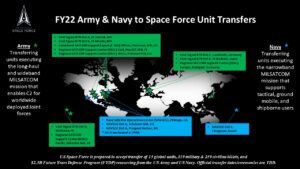Gloomy moonscape for rover test
Wednesday, 22 September 2021 09:09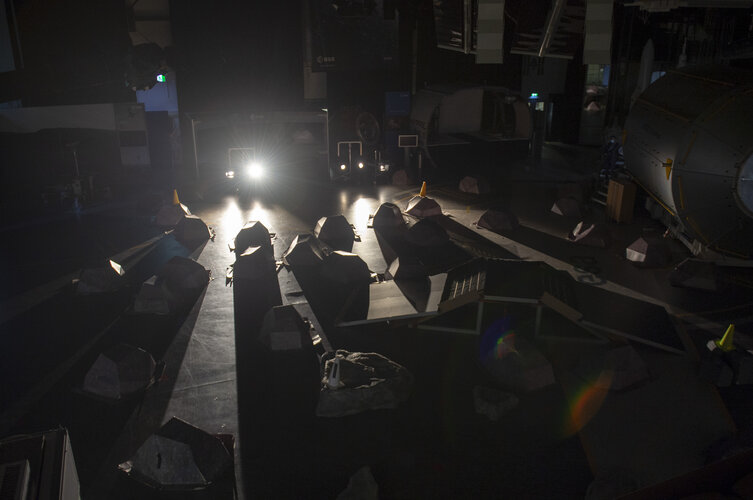 Image:
Gloomy moonscape for rover test
Image:
Gloomy moonscape for rover test Terran Orbital acquires new satellite development facility
Wednesday, 22 September 2021 07:00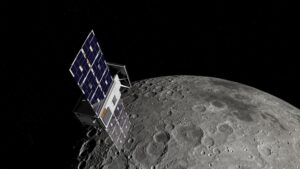
Terran Orbital, the parent company of Tyvak and PredaSAR, has acquired a new four-story facility in Irvine, California, to house satellite design, engineering and development.
Space Force looking for ‘unity’ in acquisitions despite a medley of agencies
Tuesday, 21 September 2021 22:17
Despite a medley of organizations overseeing space procurements, the Space Force and the intelligence community have stood up a coordinating group to make sure there is “unity of effort,” said Lt.
Soaring high: Pentagon's Space Force gets new uniform
Tuesday, 21 September 2021 21:00The US Space Force unveiled its new dress uniform design Tuesday, aiming to make a future-forward mark for the Pentagon's newest uniformed service.
The prototype for the new uniform for the Space Force's Guardians, as they have been officially designated, is a short navy blue jacket with a large flap over the right breast, secured by a diagonal line of six silver buttons.
It has a standing collar, and the service badge, with a delta-shaped rocket pushing into a star, is worn below the left breast.
The jacket is matched with grey trousers or skirts.
"Modern, distinctive, professional" the Space Force called it in a tweet.
"Every winning team needs a uniform! We started with the female design and then created the male prototype," wrote Chief of Space Operations General Jay Raymond.
Tested by Guardians, made for #Guardians. #SpaceForce physical training uniforms are currently undergoing wear testing. pic.twitter.com/6agT93uGDH
— United States Space Force (@SpaceForceDoD) September 20, 2021
Launched officially in December 2019, the Space Force was organized to address challenges of fighting war in the exosphere, seen as a distinct theater from the air force.
Similar designs with diagonal buttons holding down breast flaps have been seen for centuries in European and American uniforms, and are donned with large amounts of braid by marching band drum majors today.
Drones are accelerating OneWeb’s antenna tests
Tuesday, 21 September 2021 19:35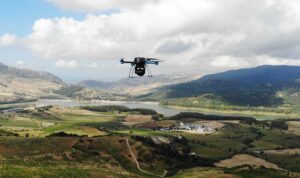
TAMPA, Fla. — OneWeb is using drones from Danish startup QuadSat to accelerate ground segment tests as it aims to bring part of its low Earth orbit broadband constellation online this year.
Scores of internet-providing satellites will soon streak across Canada's skies, but at what cost?
Tuesday, 21 September 2021 19:03
The night sky is going to get much busier thanks to thousands of new internet satellites set to launch over the next few years—and researchers say it's going to affect Canada more than most places on Earth.
Researchers from the University of Toronto, the University of Regina and the University of British Columbia found that most light pollution is expected to happen near 50 degrees latitude north and south due to the orbits of the new satellites.
Op-ed | GPS Offers Lessons for the Infrastructure of Tomorrow
Tuesday, 21 September 2021 18:42
Today, some of the more innovative uses of GPS are those that work together with other emerging technologies, thereby enabling smarter, more efficient functionality.
Space Force talent strategy is a departure from the norm
Tuesday, 21 September 2021 14:05
Chief of Space Operations Gen. John Raymond unveiled the “Guardian Ideal” document Sept. 21 at the Air Force Association’s Air, Space & Cyber conference
Could low-altitude reconnection power Jupiter's polar aurorae?
Tuesday, 21 September 2021 13:30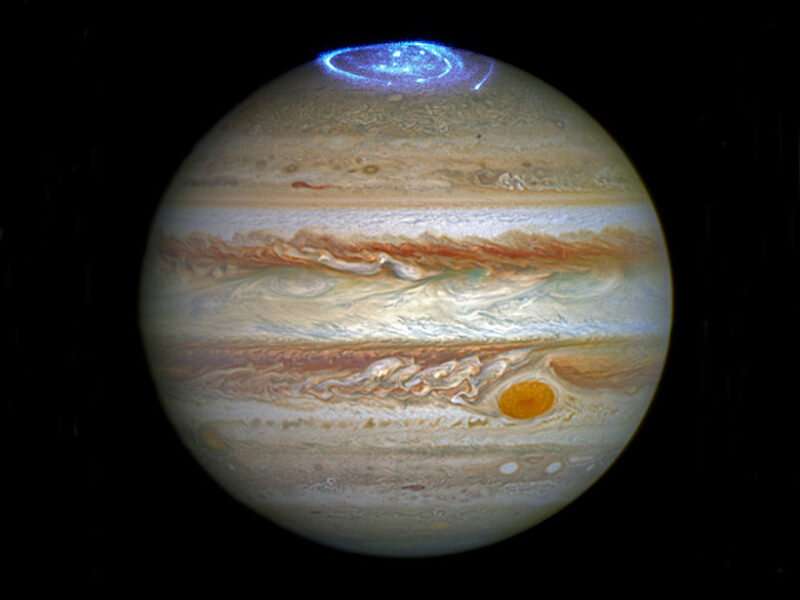
Like Earth, Jupiter's magnetic field channels electrically charged particles into its atmosphere, resulting in the formation of brilliant aurorae near its poles. However, the brightness and variety of Jupiter's auroral emissions exceed those generated on our planet. Of particular interest are patches of emission that originate from even closer to the poles than the main aurorae, a feature that appears far stronger at Jupiter than at Earth or Saturn.
Space Force reveals which Army and Navy units are moving to the space branch
Tuesday, 21 September 2021 13:28Space Force unveils dress uniforms for guardians
Tuesday, 21 September 2021 13:09
On Sept. 21 at the Air Force Association’s Air, Space & Cyber conference, the chief of space operations Gen. John “Jay” Raymond unveiled the service’s dress uniform.
Artemis rover to land near Nobile region of Lunar south pole
Tuesday, 21 September 2021 12:14 In 2023, NASA's Volatiles Investigating Polar Exploration Rover (VIPER) will land near the western edge of the Nobile Crater at the Moon's South Pole to map and explore the region's surface and subsurface for water and other resources. Part of Artemis, VIPER will launch on a SpaceX Falcon-Heavy rocket for delivery to the Moon by Astrobotic's Griffin lander under NASA's Commercial Lunar Payload
In 2023, NASA's Volatiles Investigating Polar Exploration Rover (VIPER) will land near the western edge of the Nobile Crater at the Moon's South Pole to map and explore the region's surface and subsurface for water and other resources. Part of Artemis, VIPER will launch on a SpaceX Falcon-Heavy rocket for delivery to the Moon by Astrobotic's Griffin lander under NASA's Commercial Lunar Payload
Discovery about meteorites informs atmospheric entry threat assessment
Tuesday, 21 September 2021 12:14 Researchers at the University of Illinois Urbana-Champaign watched fragments of two meteors as they ramped up the heat from room temperature to the temperature it reaches as it enters Earth's atmosphere and made a significant discovery. The vaporized iron sulfide leaves behind voids, making the material more porous. This information will help when predicting the weight of a meteor, its likelihoo
Researchers at the University of Illinois Urbana-Champaign watched fragments of two meteors as they ramped up the heat from room temperature to the temperature it reaches as it enters Earth's atmosphere and made a significant discovery. The vaporized iron sulfide leaves behind voids, making the material more porous. This information will help when predicting the weight of a meteor, its likelihoo Small stature limits Mars' ability to hold water, study finds
Tuesday, 21 September 2021 12:14 For a planet to be habitable, it must be able to hold significant amounts of liquid water.
When considering a planet's potential habitability, scientists mostly look at a planet's atmosphere and its distance from its host star. But novel research out of Washington University in St. Louis suggests size matters, too.
According to the new study, published Monday in the journal PNAS,
For a planet to be habitable, it must be able to hold significant amounts of liquid water.
When considering a planet's potential habitability, scientists mostly look at a planet's atmosphere and its distance from its host star. But novel research out of Washington University in St. Louis suggests size matters, too.
According to the new study, published Monday in the journal PNAS, NASA plans to send lunar rover to Nobile region of moon's South Pole
Tuesday, 21 September 2021 12:14 NASA's ice-hunting VIPER lunar rover, scheduled to arrive on the moon in 2023, would land near the Nobile Crater on the lunar South Pole, the space agency announced Monday.
The crater offers a relatively safe area to hunt for water ice, which is considered crucial for long-term Artemis missions to explore the moon and eventually Mars, NASA officials said. The ice could provide a water s
NASA's ice-hunting VIPER lunar rover, scheduled to arrive on the moon in 2023, would land near the Nobile Crater on the lunar South Pole, the space agency announced Monday.
The crater offers a relatively safe area to hunt for water ice, which is considered crucial for long-term Artemis missions to explore the moon and eventually Mars, NASA officials said. The ice could provide a water s 

